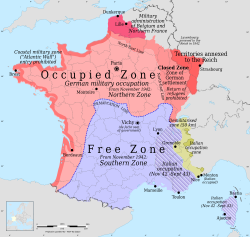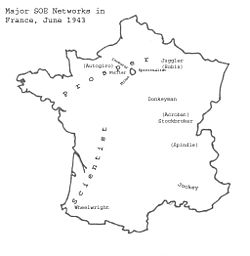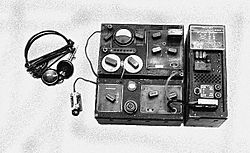Timeline of SOE's Prosper Network facts for kids
The Prosper Network, also known as the Physician Network, was a very important secret group in France during World War II. It was part of the Special Operations Executive (SOE), a secret British organization. The SOE's main goals were to gather information, cause trouble for the enemy, and explore areas in Europe and Asia that were controlled by the Axis powers, especially Nazi Germany. SOE agents in France worked closely with French Resistance groups. They supplied these groups with weapons and equipment that were dropped by parachutes from Britain.
An SOE network in France usually had three main agents: a leader, a messenger (courier), and a radio operator. However, the Prosper Network, based in Paris, grew much larger. It started in September 1942 when Andrée Borrel arrived in France, followed by its leader, Francis Suttill, a few days later. Suttill quickly found many French people who wanted to fight against the German occupation of France. Soon, the Prosper Network had connections all over northern France, from the "Ardennes to the Atlantic." It included 30 SOE agents and hundreds of French helpers. The network began to fall apart when Suttill and others were captured by the Germans in June 1943. The SOE headquarters in London, led by Maurice Buckmaster and Nicolas Bodington, were slow to realize that Prosper had been destroyed and that its radios were now controlled by the Germans. Most of the captured SOE agents and many of their French helpers were executed. SOE agents captured by the Germans often disappeared without a trace into German concentration camps or were executed.
Many stories and theories exist about why the Prosper Network fell apart. Some believe it was due to mistakes by SOE agents in France and leaders in London, along with the actions of a "turncoat" (someone who betrays their side), Henri Déricourt. Others think the errors were simply "terrible incompetence and tragic mistakes." German security forces were also very effective. Another idea is that the British intelligence services deliberately allowed Prosper to be captured. This was supposedly part of a plan called Operation Cockade. The goal was to trick the Germans into thinking the Allies would invade France in 1943. If the Germans believed this, they would keep their soldiers in Western Europe instead of sending them to fight the advancing Soviet Army in the east.
Contents
1942: The Network Begins
- September 8: French pilot Henri Déricourt arrived in the United Kingdom. He had been secretly brought out of France. British intelligence (MI5) had concerns about him, but he was still recruited by another intelligence group (MI6). His name was then given to the SOE. Déricourt's old friend, Nicolas Bodington, who was second-in-command of SOE's French section, strongly supported hiring him.
- September 25: Messenger Andrée Borrel parachuted into France. She landed near Crouy-sur-Cosson, about 160 kilometers (100 miles) southwest of Paris. She was the first female SOE agent to parachute into France. Other SOE agents, Yvonne Rudellat and Pierre Culioli, met her. They pretended to be a married couple.
- October 2: The leader of Prosper, Francis Suttill, parachuted into France near La Ferté-sous-Jouarre, about 60 kilometers (37 miles) east of Paris. He landed without a group to meet him and hurt his knee. He went to Paris to meet Borrel. Together, they traveled northern France, pretending to sell farm equipment. They used a list of contacts from another network called Carte.
- October 31: Radio operator Gilbert Norman parachuted into France. He carried a poison pill meant for Pierre Culioli, as another agent had accused Culioli of being a double agent. No one used the pill. Culioli and Rudellat were upset and stopped working with the accuser. They joined Suttill, forming a small group that became part of Prosper.
- November 8: Allied forces invaded French areas in North Africa. In response, the Germans took over the part of southern France that had been free, called Vichy France. This made life more dangerous for SOE agents in the south, but most of Prosper's work was in northern France.
- Mid-November: A German agent stole a briefcase from André Marsac, a messenger for the Carte network. The briefcase had names and information about over 200 Carte supporters. The Germans watched these people but did not arrest them right away. Suttill later unknowingly contacted many people from this list as he built the Prosper network.
- November 18: Prosper received its first air drop of guns, grenades, and explosives. Suttill, Borrel, Rudellat, and Norman were at the drop site near Étrépagny, about 75 kilometers (47 miles) northwest of Paris. The weapons went to resistance groups, including communists who were strong in the northern suburbs of Paris.
- December 30: Jack Agazarian parachuted into France to be a second radio operator for Prosper. His wife, Francine, a messenger, later joined him. They were one of the few married couples working for SOE.
1943: Growing and Falling Apart
January to June: Expansion and Early Troubles
- January 23: Henri Déricourt, code-named Gilbert, parachuted into France near Orleans. He went to Paris and lived openly under his own name, which was unusual for an SOE agent. Déricourt was in charge of air operations for Prosper. He found landing fields for secret flights from Britain, helped agents get on and off planes, and received supplies and messages. He also collected uncoded messages from agents for SOE Headquarters in London. Some say Déricourt was a friend of Karl Bömelburg, the head of the Gestapo (German secret police) in Paris before the war.
- March 18: Déricourt completed his first successful air operation. Two Westland Lysander airplanes landed at night near Poitiers. They dropped off four agents and took four others back to Britain. Déricourt arranged 11 successful Lysander landings in France by the end of June.
- April 22: Sisters Germaine and Madeleine Tambour were captured in Paris by the Germans. Germaine had been a secretary for the Carte network. Ten SOE agents had used the Tambours' house as a place to leave messages and meet. This was against SOE rules, which said agents should not have too much contact with each other. The Tambour sisters were later executed.
- May 15: Francis Suttill flew secretly to London to talk with SOE Headquarters. He was worried and criticized SOE for its mistakes. He mentioned problems within his network and thought it might have been infiltrated by the Germans.
- May 17: Two Dutch men, who were actually German agents, arrived at a Paris cafe asking for Déricourt. Several real SOE agents met with them without checking if they were genuine. This shows how easily the network could be infiltrated.
- May 21: Francis Suttill returned to Paris after his London visit.
- June 12: Suttill told friends he suspected someone he trusted was a double agent.
- June 13: During an air drop in the Sologne region, some containers of weapons exploded. This attracted German attention. Pierre Culioli asked Suttill to stop the frequent air activities, but Suttill refused. The Germans then set up checkpoints in the area.
- June 16: Two Canadian agents, Frank Pickersgill and Ken Macalister, parachuted into the Sologne region. They were met by Pierre Culioli and Yvonne Ruddelat. Their fake identification papers were out of date, so they hid while Culioli got new ones.
- June 17: Radio operator Noor Inayat Khan arrived in France by Lysander plane. Henri Déricourt met her.
- June 21: Culioli and Ruddelat were driving Pickersgill and Macalister when Germans stopped them. Macalister and Pickersgill were captured. Culioli and Ruddelat tried to escape but were caught. Culioli had a list of SOE agents' names and addresses in his briefcase. Ruddelat later died in a concentration camp. Culioli survived the war. Pickersgill and Macalister were executed.
- June 23: By this date, over 500 containers of supplies, each weighing up to 150 kilograms (330 pounds), had been air-dropped for the French Resistance.
- June 23: Jack Agazarian, now in London, wrote a report saying Henri Déricourt's security was poor.
- June 23: Gilbert Norman and Andrée Borrel were captured by the Germans in Paris. They were taken to 84 Avenue Foch, the headquarters of Josef Kieffer, the German intelligence (SD) commander in Paris. This was where captured SOE agents were usually questioned and held.
- June 24: Francis Suttill was captured by German agents in a hotel in Paris. Norman and Borrel were the only ones who knew his location. Suttill was also taken to 84 Avenue Foch. Suttill's last message to SOE Headquarters arrived in London on this day. He complained about SOE's mistake, which almost led to Noor Inayat Khan's capture.
- June 25: Noor Inayat Khan radioed SOE headquarters that Suttill, Norman, and Borrel "had disappeared, believed arrested." It took almost two weeks for more details to reach SOE.
- Late June: The captured leaders—Suttill, Norman, and Borrel—were not mistreated at first. Following SOE rules, Suttill and Norman refused to give information for the first 48 hours. This was to give other agents time to escape. Kieffer then showed them how much he already knew about the Prosper network. He made them think he had an agent in SOE headquarters and knew everything. It is said that one or both of them made a deal with Kieffer to give him information about hidden weapons in exchange for their lives and the lives of other captured agents. Kieffer later said Suttill "did not want to make any statement," but Norman "made a very full statement." Borrel also seemed to cooperate. Culioli is also said to have given information to the Germans.
- June 29: The German arrests of SOE agents and their French helpers led to a large amount of weapons and two working radios. The Germans used these radios in what they called Funkspiel, the "radio game," to trick SOE.
July to December: The Radio Game and More Arrests
- July 1: German captures of SOE agents continued. Jean Worms and fr:Armel Guerne were captured at a Paris cafe. Worms ate lunch there every day, another security mistake. SOE agent fr:Jacques Weil saw them being led away. Worms was executed later; Guerne survived. Only the communist groups working with Prosper were not affected, as they kept their own independence.
- July 7: A radio message arrived at SOE Headquarters in London, pretending to be from Gilbert Norman. It said Suttill was captured but Norman was free. However, the message lacked the special spelling mistakes and phrases Norman used to prove it was him. Buckmaster did not believe it was fake and replied, accidentally telling the Germans how to send messages that SOE would accept as real.
- July 15: SOE headquarters, still thinking Gilbert Norman was free, radioed him saying a "London representative" would come to Paris to investigate. The Germans, pretending to be Norman, replied with an address for the representative.
- July 23: SOE Deputy Nicolas Bodington and radio operator Jack Agazarian arrived in France by secret plane. Henri Déricourt met them. They went to Paris.
- July 30: A meeting was set up for Bodington and Agazarian to meet "Norman" (the Germans). Only Agazarian went, and he was captured. Bodington continued to investigate, meeting other SOE agents who told him what had happened. While Bodington was in Paris, the Germans captured three more SOE agents and a radio.
- August 3: SOE agent Henri Frager wrote a note to Bodington saying the Germans controlled several SOE radios and that Henri Déricourt was "the chief source of the Gestapo's information." Bodington did not believe Frager's accusations against Déricourt.
- August 16: Bodington returned to Britain by secret flight. He blamed the destruction of Prosper on poor security and Suttill's work with communists. He also said there was "not the slightest possibility" that Déricourt's air operations had been infiltrated by the Germans.
- September 7: SOE agent fr:Marcel Rousset was captured. He met Norman at German headquarters, who told him that he and Suttill had made a deal with the Germans. Rousset later escaped and became a major source of information about the captured Prosper agents.
- Late September: SOE agent John Renshaw Starr, captured and treated badly in Dijon, arrived at 84 Avenue Foch and met Gilbert Norman. Starr said Norman told him Suttill had made a deal with the Germans to save agents' lives.
- October 13: Noor Inayat Khan was captured with her radio by the Germans in Paris. She may have been betrayed for a reward. Noor tried to escape several times and did not give in to German questioning. Her interrogator said, "She is impossible. I never met a woman like her."
- October 21: Henri Frager returned to Britain on a flight arranged by Déricourt. Frager wanted to tell SOE headquarters that a German agent had told him Déricourt "was working for the Germans." SOE leader Buckmaster did not believe Frager.
- November 25: Noor Inayat Khan, John Starr, and fr:Leon Faye tried to escape from 84 Avenue Foch. They were recaptured. Starr promised not to try again, but Noor and Faye did not. The next day, they were sent to concentration camps in Germany, where both were executed.
- End of year: It is estimated that German arrests of SOE agents and French helpers in 1943 totaled about 400 people. More than 180 of these were sent to German concentration camps. About half of them were executed or died.
1944: The End of the War and More Tragedies
- February 9: Henri Déricourt left France by Lysander plane and returned to Britain with his wife. He was suspected of being a German agent.
- February 21: After questioning Déricourt, top SOE officials decided he should not return to France due to doubts about his loyalty and his contacts with the Germans.
- February 29: The Germans continued to use captured SOE radios to trick SOE. They captured France Antelme, an experienced agent, his radio operator fr:Lionel Lee, and his messenger Madeleine Damerment as they stepped off the plane from Britain. All three were imprisoned and later executed.
- April 18: Gilbert Norman, Frank Pickersgill, and John Macalister were among about two dozen SOE agents transported to Germany by train. Norman was in poor health. He said he had tried to escape and had been shot three times.
- June 6: Allied forces invaded France on D-Day. As the Allies advanced, the Germans moved SOE agents imprisoned in France to Germany, where most were executed. The radio game the Germans played with SOE ended. Josef Kieffer, the German intelligence head in Paris, sent a mocking message to Maurice Buckmaster at SOE.
- July 6: Andrée Borrel was one of four female SOE agents executed by injection at the Natzweiler-Struthof concentration camp.
- September 6: Gilbert Norman was executed at Mauthausen concentration camp.
- September 12: Noor Inayat Khan was executed at Dachau. She was shot by an SS guard.
- October 5: Henri Frager was one of several SOE agents executed by shooting at Buchenwald.
1945: The War Ends
- March 23: Francis Suttill was executed around this date at Sachsenhausen concentration camp near Berlin. He had been held alone in prison.
- March 29: Jack Agazarian was executed at Flossenbürg concentration camp.
- May 8: World War II ended in Europe when Germany surrendered.
After the War
- January 15, 1946: The SOE organization was officially closed down by the British government.
- November 22, 1946: Henri Déricourt was arrested by French police in Paris. He was accused of working with the enemy.
- January 1947: Vera Atkins, who used to be an SOE intelligence officer, interviewed Josef Kieffer. Kieffer, the former German intelligence head in Paris, had been captured and was waiting for his trial. Kieffer confirmed that Henri Déricourt had been a German agent. However, Atkins' report of this interview was very short and unclear. Kieffer did not confirm if he had made a deal with Suttill or Norman, but he said Norman "helped a lot," as did other SOE agents. He said Noor Inayat Khan, France Antelme, and Frank Pickersgill did not "help."
- March 12, 1947: A war crimes trial by the British found Kieffer guilty of ordering the execution of five British soldiers. This charge was not related to his role in destroying the Prosper Network. SOE agent John Starr, who had been Kieffer's prisoner, was the only witness who spoke in Kieffer's defense. Starr said he and other prisoners were treated well. Kieffer was sentenced to death.
- June 26, 1947: Josef Kieffer was executed. Many people, including Vera Atkins, questioned why Kieffer was executed so quickly, especially since he knew so much about SOE and the Prosper Network. Most of his knowledge died with him.
- January 29, 1948: Henri Déricourt, who was still waiting for his trial, wrote to his wife saying he expected to be released because the accusations against him were weakening.
- May 8, 1948: Former SOE Deputy Nicolas Bodington testified in Déricourt's defense at his trial. Bodington stated that SOE headquarters knew about Déricourt's contacts with the Germans. He said, "I had total trust in Déricourt and recommended he maintain his contacts with the Germans." No one from SOE testified against Déricourt, and Vera Atkins' report about Kieffer's interview was not used as evidence. Déricourt was found not guilty. Many former SOE agents, including Atkins, were angry because they believed he had betrayed SOE. It remains a mystery why no former SOE officials or agents testified against Déricourt.
|





